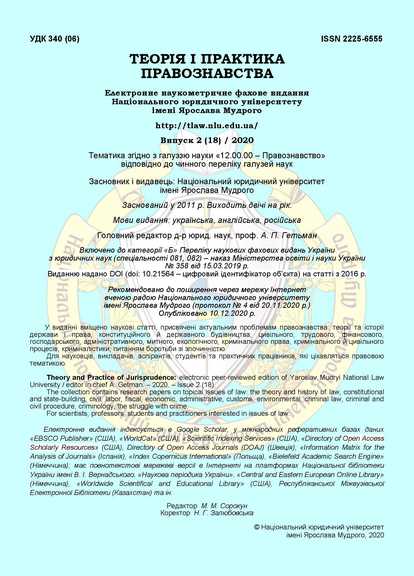Confucius doctrine as a leading phenomenon of Chinese civilization (theory and history)
DOI:
https://doi.org/10.21564/2225-6555.2020.18.213550Keywords:
Confucius, Confucianism, Eastern Zhou, Zhanguo, civilizational crisis, Lunyu, Yin/Yang, Wu xing, Dao, Where, Zheng Ming, Xin, Junji, ke, Shan Ren, Xiao Ren, Zhi, Li, Yi, Ren, yunji, he, Tiao, Zhong’un, Shu, Xiu JI, Da XueAbstract
The article is devoted to a comprehensive analysis of the doctrine of Confucianism. The author outlines the figure of Confucius, analyzes the historical background of the initial stage of the formation of Confucianism and the place of this period in the history of China, the main components of the Confucian Canon, principles and categories, the internal logic of the doctrine, the significance of the doctrine for the formation of an integral system of Chinese worldview, moral, ethical and political judgments, attitudes and norms.
Against the background of the study of a significant monographic literature, conclusions are drawn about the nature and features of the value core, the principles of China’s national identity.
China is a country with an ancient almost continuous history. Throughout the historical period of its existence, it has exerted a huge influence not only on neighboring countries, but also on the world as a whole. Almost by the end of the XVIII century. China had the largest GDP and was one of the leading cultural centers. At the present stage, China has a significant economic, political and cultural impact even on fairly remote regions. Today, there is a great return of this country-civilization, on the one hand claiming world leadership in the XXI century, and on the other, it stands for a multipolar world.
According to economic indicators, China is one of the three leading countries in the world and offers the world its model of globalization through the so-called "One belt one road" project.
Confucius is a representative of the traditional Chinese ethical and legal paradigm, a brand that China offers to the world as part of its own globalization strategy, which provides for the creation of institutions that bear the name of this "first sage of the middle Kingdom"References
Adamchik, V.V., Adamchik, M.V., Badan, A.N. et al. (2004). Istoriya Kitaya. Minsk: Harvest [in Russian].
Enciklopediya stran mira. (2004). N.A. Simoniya (Ed.). Moscow: ZAO «Izd-vo «Ekonomika» [in Russian].
Skarmari, M. (2003). Drevnij Kitaj. Kitajskaya civilizaciya ot neolita do epohi Tan. Moscow: AKT ; Astrel’ [in Russian].
Malyavin, V.V. (1992). Konfucij. Moscow: Molodaya gvardіya [in Russian].
Dugin, A.G. (2014). Noomahiya: vojny uma. Po tu storonu Zapada. Kitaj, Yaponiya, Afrika, Okeaniya. Moscow: Akademicheskij proekt [in Russian].
Harrison, L. (2016). Evrei, konfuciancy i protestanty: kul’turnyj kapital i konec mul’tikul’turizma. Moscow: Mysl’ [in Russian].
Grane, M. (2004). Kitajskaya mysl’. Moscow: Respublika [in Russian].
Maslov, A.A. (2018). O chem dumayut kitajcy? 1127 faktov ot risa do Konfuciya. Moscow: RIPOL klassik [in Russian].
Tojnbi, A. (1996). Postizhenie istorii. A.P. Ogurcov (Ed.). Moscow [in Russian].
David, R., Zhoffre-Spinozi, K. (1999). Osnovnye pravovye sistemy sovremennosti. Moscow: Mezhdunarodnye otnosheniya [in Russian]
Downloads
Published
How to Cite
Issue
Section
License
Copyright (c) 2020 Віталій Анатолійович Лизогуб

This work is licensed under a Creative Commons Attribution 4.0 International License.




